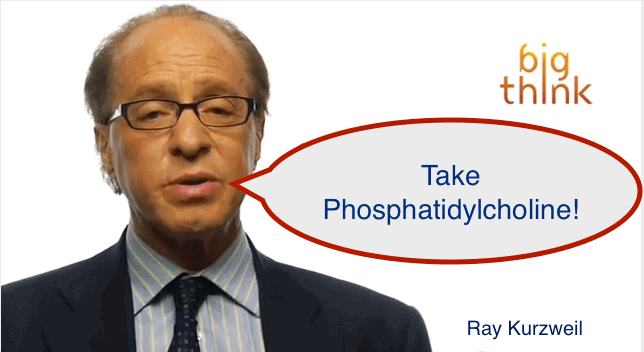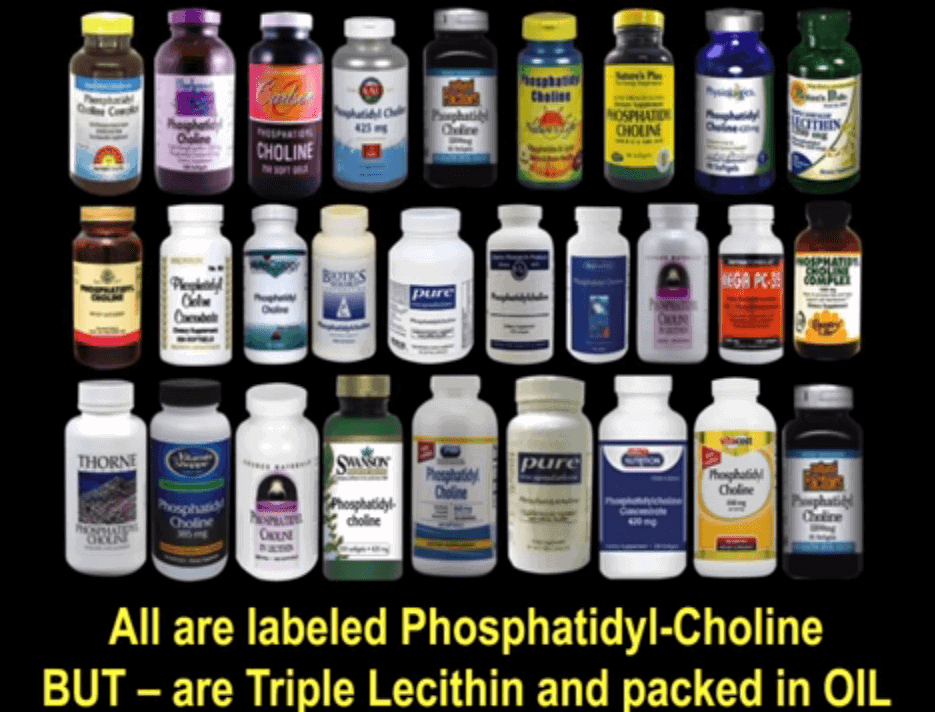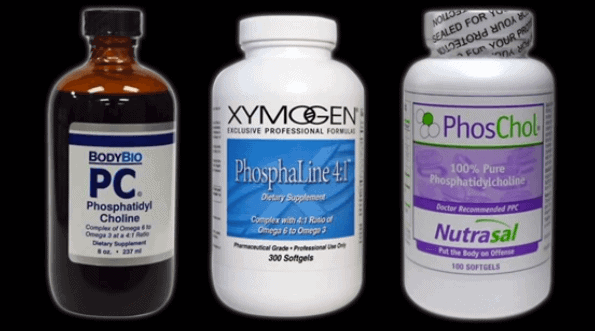One Supplement to Boost Your Brain Power and Reduce Wrinkles
How can one supplement both boost your brain power and reduce wrinkles? It’s all about cell membranes and keeping them robust as we age. WATCH
 (Source: BigThink.com — see video below.)
(Source: BigThink.com — see video below.)
Updated on 6/27/19
HOW WOULD you like to be able to boost your brain power like RAY KUZWEIL does? Remember him, our erstwhile brainiac, life extension enthusiast and futurist, that Time Magazine named “the restless genius”?
Well, he loves Phosphatidylcholine, and you should too.
Why?
Because, as he’ll tell you in the video below, Phosphatidylcholine declines with age, and as it does we get wrinkly and our organ function becomes impaired — like our brains — among other things.
Just because you can’t pronounce it, doesn’t meant that Phosphatidylcholine isn’t worthy of your consideration, especially since you have less of it each year, as it’s levels naturally decline as we age.
So, how in the heck can one supplement boost your brain power AND reduce wrinkles (among other things)? There’s got to be some common denominator here, and there is — the cell membrane! Our cell membranes do a lot more than you think, and when they gradually become less robust, so do we.
Turns out, your Phosphatidylcholine level is an important factor essential to maintaining, or improving, the robustness of your cell membranes.
I first heard about Phosphatidylcholine (“PtC”) in 2010 when reading Ray Kuzweil’s and Terry Grossman’s book Transcend. I knew that the health of the mitochondria – the so-called cellular power plants that produce our energy – was extremely important to maintaining vitality as we age, but what was surprising was the important multi-faceted role of the cell membrane.
Most people know that cell membranes protect cells from their surroundings by being selectively permeable to specific substances (such as ions and organic molecules) so they can move in and out the cell. Thus, PtC is a surfactant, which means that it’s responsible for maintaining the surface tension of cell membranes and controls what enters and leaves the cell through the membranes.
Less known is that the cell membrane is responsible for propagation of neuronal messages (both sending and receiving), it manages the production of energy in the mitochondria, and manages our senses, particularly sight. (1)
The cell membrane is only five nanometers thick, made of four phospholipids (a fatty acid class of essential molecular compounds) that link together to form it. Stack 10,000 sheets of these membranes one upon the other and they would be as thick as a sheet of paper.
Two important phospholipids are Phosphatidylcholine (PtC), the subject of this article, and Phosphatidylserine, which I intend to write about soon. A cell in the human body cannot function normally without these two crucial phospholipds. As the name implies, phospholipids are made of the combination of lipids (fats) and the mineral phosphorus.
PtC is found in higher concentrations in young people, particularly in brain tissue (explaining the trope, “boost your brain power”.) Like a lot of things related to our biology, the amount of PtC in cell membranes decreases as we age.
By taking supplemental PtC, you can reverse the age-related decline of PtC in your cell membranes and keep it at a youthful level.
Studies have found that PtC supplementation can aid memory and learning, may help promote normal skin elasticity and support healthy liver function.
Research indicates that PtC can stimulate reverse cholesterol transport – the removal of cholesterol from artery plaque — basically the same process that high- density lipoprotein (“HDL”, the “good” cholesterol) promotes. (2)
At this point you know that:
- PtC is one of four phospholipids that form your cells membranes;
- Such membranes are critically important to selectively control what goes in and out of cells, and, in effect, enable neuron communication;
- Our bodies’ production of PtC declines with age; and
- PtC supplementation can improve memory and learning, skin elasticity, healthy liver function, and remove cholesterol from artery plague.
But there’s more to know about PtC, and for that, let’s turn to a good resource on supplements, wholehealthmd.com; specifically to their Phoshatidylcholine review, which informs the next sections on what Ptc is, its potential health benefits, and guidelines for use.
What Is Phosphatidylcholine?
The first thing to know is that PtC is a major component of lecithin, a compound that naturally occurs in all cell membranes and essential for biological functions. Lecithin is found in eggs and plants such as mustard, soy, and sunflower.
Egg lecithin contains about 69% of PtC, but most of it is extracted from plant lecithin (about 24% PtC), as they’re considered safer than animal sources.
In the body, PtC is the major supplier of choline, which is a precursor to the neurotransmitter acetylcholine. Acetylcholine is necessary for optimal brain and nerve function. As a result, researchers are interested in using PtC for improving memory and treating neurological conditions such as multiple sclerosis and Alzheimer’s disease. (3)
This video by BodyBio will be helpful to help understand how Phosphatidylcholine’s ability to repair and maintain cell membranes can help boost your brain power with Phosphatidylcholine helps with the the repair and maintenance of the cell membrane, leading to a potential boost your brain power; particularly, an increase in brain function, mental alertness and motor skills.
Health Benefits of Phosphatidylcholine
Animal studies indicate that PtC alone, and in conjunction with Vitamin B12, improves memory. However, studies in humans have thus far shown no significant improvement in memory loss for Alzheimer’s patients; more human studies are needed. (4)
According to wholehealthmd.com, Phosphatidylcholine may help to:
- Reduce Inflammation in stress conditions. Choline derived from PtC exhibits anti-inflammatory properties in stress conditions. Systemic inflammation is a precursor for many chronic disease conditions associated with aging, so it’s very important that it’s kept in check. A recent animal study indicated dietary PC supplementation in conjunction with two other lipids decreased inflammation in mice with pleurisy, an inflammation of the membrane surrounding the lungs. This study confirms a potential for anti-inflammatory properties in humans.
- Reduce gastrointestinal toxicity of ibuprofen. Long-term use of non-steroidal anti-inflammatory drugs (NSAID) such as ibuprofen has been known to cause gastrointestinal injury particularly in patients aged 55 and older. In a study of 125 patients with osteoarthritis, a dose of 2400 mg/day of ibuprofen or an equivalent dose of ibuprofen-PC was administered for six weeks. Patients that were given ibuprofen-PC showed a trend toward improved gastrointestinal safety.
- Reduce hyperlipidemia in dialysis patients. Dialysis patients have a high incidence of cardiovascular complications; therefore, hyperlipidemia (elevated blood lipids) is of particular concern. Phosphatidylcholine makes cholesterol more soluble and less able to cause hardening of the arteries. In a 1989 study, dialysis patients with serum cholesterol levels of 260mg/dl or higher were given a placebo or PtC. The PtC group showed a decrease in total cholesterol levels and triglyceride levels indicating PC supplementation is effective for hyperlipidemia.
- Reverse fatty liver and other liver damage. PtC supplementation may be used in the treatment and reversal of liver damage. Research has shown that the fatty liver, which is a complication of long-term intravenous feeding in critically ill patients, may be reversed.
(See Milk Thistle below)
- Treat effects of hepatitis. Studies indicate PtC supplementation reduces the effects of hepatitis B including liver damage. In hepatitis C, one study indicates PC supplementation in conjunction with Interferon and after termination of interferon reduces the relapse rate.
- Treat Fat deposits. PtC injections have been used in Europe since 2002 for to cause lipolysis—the breakdown of fat in fat cells. In a 2005 study, patients with lower eyelid fat pads were given PtC injections that were cosmetically beneficial, and still observable after nine months.
- Alleviate premenstrual syndrome (PMS). Studies have shown that omega-3 phospholipids from the tiny Antarctic shrimp known as Krill, which contains mostly PtC in conjunction with other phospholipids outperformed conventional fish oil in the treatment of symptoms of PMS and dysmenorrhea (painful menses).
- Improve exercise performance. Studies indicate oral PC supplementation improves performance in various sports activities where exercise has depleted choline concentrations. More research is needed to determine minimum dietary requirements.
(Go read the wholehealthmd.com Phosphatidylcholine page for more information and references in support of the above made assertions.)
Use Phosphatidylcholine with Milk Thistle
Those of you who use Milk Thistle for liver health and/or detoxification will be interested to know that combing it with PtC will improve it’s absorption ten-fold.
The Life Extension Foundation has a good article about this that makes the following points about Milk Thistle and PtC:
The benefits derived by Milk Thistle supplementation are undercut because various components of it, like silybin) do not dissolve well in water, making it difficult for our bodies to absorb.
Bioavailability can be enhanced by consuming Milk Thistle together with PtC, as it’s believed that PtC molecularly bonds to the silybin molecule and wraps around it, ushering it through the membranes of cells in the intestinal tract.
The silybin-phosphatidylcholine complex is absorbed nearly 5 times better than Silymarin alone, and its ultimate concentration to the liver, its target organ, is 10-fold greater than Silymarin alone.
Guidelines for Use
PtC can bet taken both as an oral supplement, and as an intravenous therapy. When taking orally, make sure you use a brand that is at least 50% pure. The great majority of supplements labeled as Phosphatidylcholine are only about 30% PtC. Food grade lecithin contains PtC but only about 20 to 25% is PtC.
I thank Ed Kane and wife Patricia Kane, Ph.D, founders of BodyBio, for the admonition that we need to be very brand conscious when it comes to PtC supplementation in order to only consume those that offer high purity.
I took the following screenshot from a video that Ed Kane had on YouTube, which has since been taken down, of all the Phosphatidylcholine supplement brands that are just lecithin packed in oil, he asserts:
The brands Mr. Kane recommends is shown on this next screenshot, including one made by his company, BodyBio:
Surely, there are others that meet the 50% minimum criteria, but if you want to be safe, use one that Ed Kane, an expert on Phosphatidylcholine, recommends: BodyBio – PC Phosphatidylcholine.
PhosChol also makes a product worth examining.
Phosphatidylcholine Dosage
According to wholehealthmd.com the therapeutic range of PC intake is 800-2,400 mg daily, and 4.6 grams or higher for liver salvage. To enhance absorption, take PC 20 to 30 minutes before meals with a 6- to 8-ounce glass of water or juice.
Kurzweil on Phosphatidylcholine
As mentioned, Ray Kuzweil names Phosphatidylcholine as one of his three must-have supplements. He chose the three from the more than 100 he consumes every day, so that’s a ringing endorsement, I’d say.
As you soon see, the other two are Vitamin D (particularly, Vitamin D3) and CoQ10. You can read all you’ll ever wanna know about Vitamin D in my article, 30 Reasons to Take Vitamin D. Regarding CoQ10, know that its ubiquinone form is better absorbed.
Your Takeaway
- Phosphatidylcholine is essential for cell membrane health, and all that it influences, but it declines with age.
- You can increase your Phosphatidylcholine levels supplementing with PtC neutraceuticals (a fancy word for nutritional supplements), which, in addition to boosting your brain power, can potentially reduce inflammation and cholesterol levels, and improve liver function, among other health benefits.
- Choose a supplement brand that contains at least 50% pure Phosphatidylcholine.
Last Updated on February 27, 2022 by Joe Garma






